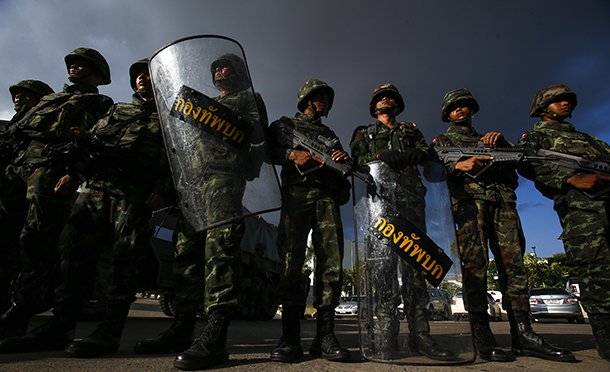The Myanmar Journalists Networks (MJN) and the Myanmar Journalist Association (MJA) have both issued statements calling for the release of journalists detained in neighboring Thailand following a military coup.
In statements issued on Tuesday and Wednesday, both groups said they were concerned about restrictions on media that have followed the May 22 seizure of power by Thailand’s National Council for Peace and Order (NCPO).
“It is not proper to arrest journalists and suspend some media, the ears and eyes of the nation in such important period, not only for the Thai Media industry, but for the rest of neighboring ASEAN countries,” the MJN said.
“Thus, the Myanmar Journalists Networks strongly demand that the [NCPO] free the arrested journalists as soon as possible and to practice freedom of the press.”
The statements mark a reversal of recent history. In the past, Thailand’s media has enjoyed a high level of freedom, while Burma was for decades under a strict censorship regime, with some media outlets covering the country from Thailand. However, since the government of Thein Sein took power in 2011, censorship has been abandoned and private daily newspapers have been allowed to publish in Burma.
MJA, which has signed a cooperation agreement with the Thai Journalists Association, said Burmese journalists can sympathize with their Thai colleagues since they have experienced “similar restrictions and persecutions under the former governments.”
“Therefore, we would like to appeal earnestly to [the] Thai military government to restore the freedom of the press after lifting the restrictions on Thai journalists and ceasing arbitrary arrests if they are really desirous of bringing about genuine national reconciliation and safeguarding democracy,” MJA said.
France-based organization Reports Without Borders also denounced the Thai military’s actions.
“Two journalists, Thanapol Eawsakul and Pravit Rojanaphruk were detained on 23 and 24 May after being summoned by the military,” a statement on Monday said.
“The army is continuing its efforts to halt the flow of news and information, imposing its editorial line on news organizations and ordering them not to publish anything that might ‘fan the conflict.’”
Reporters Without Borders said 19 editors and publishers had been called in by General Prayuth, head of the Thai junta to discuss their coverage of the country’s situation. TV and radio stations have also been subjected to restrictions and some have been taken off air, the statement said.

















